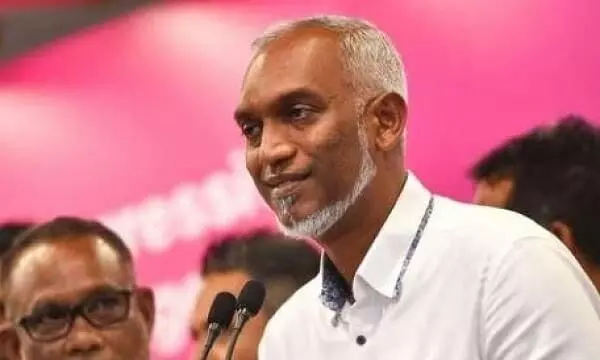
The Maldives and Lakshadweep
text_fieldsMaldives’ President Mohammed Muizzu (Photo credit: AFP)
The Maldives, an archipelago of around a thousand small and large islands in the Indian Ocean, has asked the Indian military officials stationed there to leave the country by March 15, following a rift in the historical ties between India and the Maldives. Relations with India have been strained since the current president Muhammad Muizzu came to power last November with 54% of the votes. Prior to this, Maldives' policies had been displaying a pro-China tilt during the period when the Progressive Party of Maldives (PPM) was in power from 2013 to 2018. However, with the election of Ibrahim Soli of the Maldivian Democratic Party (MDP) in the 2018 elections, the bilateral rapprochement and engagement with India changed the picture. That friendship has now been shaken to a large extent.
Also read: Maldives sets deadline for India to withdraw troops amid tensions
It is clear that Maldives-China friendship has a role to play in the current developments. The anti-India campaigns there also made the atmosphere worse. The latest manifestation came when three junior ministers made derogatory remarks against India and Prime Minister Modi. But regardless of the government's policy, the president was forced to suspend the three because the remarks they made were so insulting that even the government could not accept them. Observers point to other signs that Maldives has been sidelining India even before that. India customarily was the first foreign country visited by any ruler who took office in Malé. But instead, Muizzu made Ankara, the capital of Turkiye his first destination. Although India has no problems with Turkiye, this change of destination raised eyebrows in India. Not long after this, Muizzu after his return from a five-day visit to China on Saturday, told the media that the Maldives is not in the backyard of any country and that it will stop relying on a single country for its essential goods. The implication is clear if one remembers that most of the imports of essential goods are from India and the tourism sector, which generates two-thirds of Maldives's income, gets a majority of its tourists from India. Moreover, during his visit to China, he held extensive discussions with various Chinese authorities and signed 20 agreements. It is not to be lost sight of that the demand for the withdrawal of Indian military personnel came on the heels of this.
Also read: ‘We aren't in anyone's backyard’: Maldives President after China visit
For India, the world's leading economic and military power with a population of 1.4 billion, sees the Maldives, a tiny island nation with a population of 5.20 lakh, is a sub-topic. The international importance of the Maldives is only as a strategic base in the Indian Ocean. It is clear that if they are ready to entangle a country like India, other factors will be at work. The anti-Indian tweets did also draw irate reactions from the Indian side on social media. And there were widespread calls for a boycott of tourist visits to the Maldives. When a leading air-travel booking portal also suspended bookings to the island destination, that gave the impression that this was not just a popular reaction.
Also read: 'Strongly opposes' external inference into Maldives: China
Almost in parallel appeared advertisements promoting India's Lakshadweep as a tourist destination and pictures of Prime Minister Modi's visit to the island which have also been portrayed as moves against the Maldives. Although the clear, blue, pristine waters of Lakshadweep can lure any tourist, there are differences of opinion as to whether Lakshadweep, which has only a small area and mostly consists of coral reefs, is suitable for developing infrastructure and large-scale constructions necessary for tourist flow on a commercial basis. Apart from that, the central government over the last few years has been carrying out administrative reforms, regulations, and projects in the name of development in Lakshadweep of a kind running counter to the tradition of Lakshadweep residents. Even if all that is left aside, what India should ideally attempt is to be magnanimous to its smaller neighbour in its approach and prevail on the Maldives rulers about the imprudence of its own policies. Even as the actions of the islands are strategically unwise, it has to be allowed the autonomy to follow its choice, a role for which India has the diplomatic maturity. The Maldives should be persuaded to refrain from a policy of over-dependence on China and risking its self-respect. The positive in the equation is that New Delhi is still adopting an approach of keeping the doors of talks open.
Also read: Lakshadweep can't handle high tourist influx, says MP Mohammed Faizal






